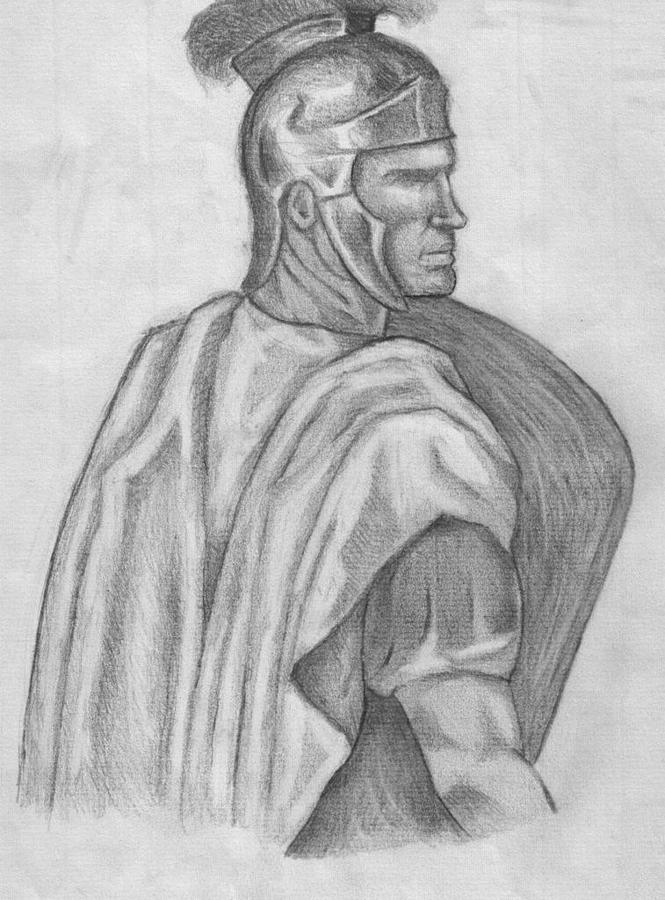By Claire Hines, Year 12
The rain fell in a gentle drizzle as I stepped out onto the street, pulling the folds of my military cloak closely about me as I did so against the whispers of the mocking wind. A storm was coming. Sounds of laughter, heavy with drunkenness resounded about me, as my fellow guests spilled out of the house into their waiting litters. I stood at the foot of the steps of the Senator’s house pretending to listen to Gaius, who wanted me to join him at his villa for more revelry. Too far gone, he seemed deaf to my protests and was rambling on in a loud and incoherent voice. I turned away from him in disgust, and it was then that I saw her.
She stood outlined against the light pouring out of the doorway, a white cloak draped lightly over her head. She turned to exchange a word with the Senator, who was bidding his guests a good night, and as she did so, her profile was clearly distinguishable in the harsh lamplight. I drank in the familiar dusky hair, the gentle dimples in her cheeks, the sparkle in her eyes that I knew so well, that stubborn snub nose that I loved, and the determined chin. It was Vispania. The sky lit up as a lightning bolt from Olympus struck the distant hills. It was followed by the grumble of angry thunder, but I didn’t even notice.
Perhaps she was slightly thinner, and maybe a little quieter, but she was my Vispania, without a doubt. The one Emperor Augustus had forced me to divorce that I might marry his abominable daughter, Julia. The only woman I had ever loved. The only woman I still loved. But the Emperor must be obeyed.
I opened my mouth to call out to her, but the words died on my lips. Any word exchanged between us could endanger her. Had he not ordered me to have nothing more to do with her? Had we not both received the same instructions? Tears of helplessness and longing welled up in my eyes. How often had I dreamt of her, how many times had I passed in front of her new home, where she now lived with the husband the Emperor had given her in my stead, hoping to catch sight of her at one of the windows?
Gaius broke into my thoughts with an exclamation of annoyance as he had only just realised that I hadn’t been listening in the slightest to his meaningless talk. I shook my head slowly without taking my eyes off her, as she stepped towards the litter that had been brought before her, preparing to alight.
“Another time Gaius, but not now. Not now.”
The litter was swung up onto the shoulders of stout slaves, and it started to move off into the darkness. Without another word or thought I followed. It was only after I had walked a street or two, close behind them, that I realised my folly. There had been many there in front of the house who would have seen me go, and the Emperor would know by morning. But the heart has reasons that reason will never know.
The litter swung steadily from right to left, and I followed it desperately, as a drowning man swims for the shore. I had nothing left but this. Nothing more. To be so close and yet so far from her was tearing my heart apart. The steady drizzle of rain thickened, and another lightning bolt lit up the sky. I pushed past the busy traffic of carts and wagons that choked up Rome’s streets at night. They swore angrily as they parted to make way for her litter, and swore even more when I climbed over them after her. But when they recognized my face, they fell silent in surprise and fear. The thunder laughed overhead and the sound echoed in my ears.
When she stopped in front of the Senator’s house (I could not bear to think of it as hers), only then did I stop. I watched, mesmerised, as the litter was laid upon the ground, and slaves came out of the house with lit torches, lighting up the dark street. As she stepped out, pulling her cloak tightly about her, she turned and saw me.
She knew, she understood. She looked at me sadly, and that gaze was worth all the words in the world. It said: I still love you, you know. Nobody in the world can take that from us, not even an Emperor. Then she was gone, and the slaves followed her into the house. The street was instantly plunged into darkness, as was my heart.
The wound that had never quite healed had opened again with renewed force, and I felt weak and broken. What was left to live for? The dark, damp streets watched me indifferently that night as I stumbled back to my town house, blinded by rain intermingled with my bitter tears.
I am not sure how I got home, but I did. The next day, Emperor Augustus Caesar summoned me to the palace. Carefully clad in my best armour and with a crisp step, I followed the envoy into the Emperor’s presence. He sat quietly at his desk, steadily sharpening a glimmering dagger on a smooth stone, with a regular screeching sound that he alone seemed to be immune to. Agrippa, as always, stood behind him seemingly not immune to the noise. He did not meet my gaze, and stared obstinately out of the window. Augustus suddenly stopped his fun and games, and turned his hardened eyes upon me.
Augustus always made me nervous. He was one of those men who gave you the impression he knew ten times as much as you and then some, which he undoubtedly did. He trusted no one, and the feeling was very much mutual. With fair hair and steely brown eyes that never gave anything away, but never missed anything either, and a slight lithe figure, he was indeed a deceptive character.
He searched my eyes for a long time until he appeared satisfied, and then announced suddenly:
“You followed Vispania Gallus yesterday all the way to her house.” He stressed the name Gallus, and continued: “Apparently you were crying. Why did you cry, Tiberius?”.
I said nothing. Neither did Agrippa, Vispania’s father, who remained at the window, seemingly impassive.
Augustus never once took his eyes off me, those hateful eyes that analysed my every word and gesture. He declared in an icy tone dripping with threats that Julia, his daughter, was my wife, whilst Vispania was ‘Gallus’. I was never to lay eyes on her again, and he would see to it that I never had an opportunity to do so. With that he dismissed me, and I walked out the door with those same crisp steps. I had evidently fallen into his disfavour, but that was nothing new.
I carried her glance with me out of the palace. And as I walked out into the sunlight, I knew why I had followed her. It was simply a word, a word that was reason enough in itself. For the heart has reasons that reason will never know.
Artwork by Jeremiah Cook (https://fineartamerica.com/featured/roman-jeremiah-cook.html).



